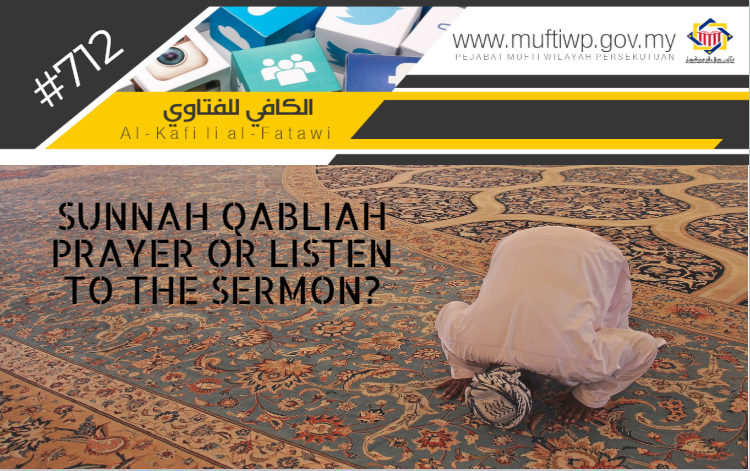
Question:
Assalamualaikum wbt,
In the mosque where I usually went for Zuhur prayer, they would hold a sermon before the prayer. It would usually go as follows; after the end of the sermon, the iqamah is called and the congregational Zuhur prayer is performed. Is it prioritized to immediately pray before performing the sunnah ba’diah prayer or should I move to the back and perform the ba’diah sunnah Zuhur prayer and leave the sermon?
Answer:
Waalaikumussalam wbt,
Alhamdulillah, praise and thanks to Allah for the countless blessings He has blessed us all with. Blessings and salutations to the Prophet Muhammad PBUH, his wives, his family, companions and all those that follow his teachings to the day of judgement.
First, we assumed that maybe the questioner is confused regarding the terms qabliah and ba’diah. According to syarak, it is sunnah to perform the qabliah (before) Zuhur and ba’diah (after) Zuhur. The prioritized sunnah is 4 rakaat of qabliah and 4 rakaat of ba’diah sunnah prayers. This is in accordance with a hadith from Aisyah R.Anha, where she said:
أَنَّ النَّبِىَّ صَلَّى اللهُ عَلَيْهِ وَسَلَّمَ كَانَ لاَ يَدَعُ أَرْبَعًا قَبْلَ الظُّهْرِ وَرَكْعَتَيْنِ قَبْلَ الْغَدَاةِ
“The Prophet (ﷺ) never omitted four rak'ahs before the noon prayer, and two rak'ahs before the dawn prayer.”
Sahih al-Bukhari (1127)
In another hadith from Aisyah R.Anhuma, she explains:
كَانَ يُصَلِّى فِى بَيْتِى قَبْلَ الظُّهْرِ أَرْبَعًا ثُمَّ يَخْرُجُ فَيُصَلِّى بِالنَّاسِ ثُمَّ يَدْخُلُ فَيُصَلِّى رَكْعَتَيْنِ
“Before the noon prayer, he used to pray four rak’ahs in my house; then would go out and lead the people in prayer; then come in and pray two rak’ahs.”
Sahih Muslim (730)
The Prophet PBUH then added 2 more rakaat afterwards. This is in accordance with a hadith from Ummu Habibah R.Anha, where she said, I heard the Prophet PBUH said:
مَنْ صَلَّى أَرْبَعِ رَكَعَاتٍ قَبْلَ الظُّهْرِ وَأَرْبَعًا بَعْدَهَا حَرَّمَهُ اللهُ عَلَى النَّارِ
"Whoever prays four rak'ahs before Zuhr and four after, Allah, the Mighty and Sublime, will forbid him from the Fire."
Sunan Abu Daud, al-Tirmizi, al-Nasaie, Ibn Majah and Ahmad and authenticated by al-Tirmizi (427 & 428)
Second, it is prioritized for the mosque to not leave the calling of adhan for it is an eminence in Islam. Its broadcast is also a signal for the public that the time of prayer has started, especially if the mosque is the centre of religious activities of the community. From Fiqh perspective, it is sunnah muakkadah to call out the adhan for the prayer that is about to be performed even after some duration of time has passed. (Refer Fiqh al-Manhaji, 1/114). This means, it is not an issue to call out the adhan even after the sermon is completed. However, we suggest that it is best to put the sermon on pause and call out the adhan when Zuhur prayer time started, then continue with the sermon, maintaining the rights of both the preacher and adhan for prayer.
Third, it is not an issue to perform the sunnah qabliah and leave the sermon. It is better if someone listen to the sermon after praying if it hasn’t ended. Regarding whether one should move to the back or just pray in the praying area, in our opinion, it is best to be mindful of the preacher and politely moves to the back to avoid disturbing his sermon. In a hadith of the Prophet PBUH, which is then been applied as Islamic legal maxim states:
لَا ضَرَرَ وَلَا ضِرَارَ
“There should be neither harming nor reciprocating harm.”
Narrated by Ibn Majah (2341), al-Daraqutni (4/228) and others with continuous sanad, and also narrated by Imam Malik (2/746) in Muwattho’.
We would also like to advise the imam and the congregation to not leave the sunnah qabliah and just immediately perform the prayer after the sermon has ended to gain the rewards of the sunnah prayer. Abdullah bin Mughaffal al-Muzani RA narrated the Prophet PBUH said:
بَيْنَ كُلِّ أَذَانَيْنِ صَلاَةٌ، بَيْنَ كُلِّ أَذَانَيْنِ صَلاَةٌ، ثُمَّ قَالَ فِي الثَّالِثَةِ: لِمَنْ شَاءَ
"There is a prayer between the two Adhans (Adhan and Iqama), there is a prayer between the two Adhans." And then while saying it the third time he added, "For the one who wants to (pray).
Sahih al-Bukhari (627) and Sahih Muslim (838)
Wallahua’lam.

